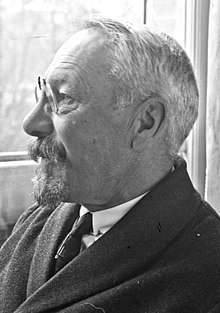Jules Jeanneney
Jules Emile Jeanneney [ ʒyl eˈmil ˌʒanəˈnɛ ] (born July 6, 1864 in Besançon , † April 27, 1957 in Paris ) was a French politician of the Radical Party . From 1932 until the end of the Third Republic he was President of the French Senate .
Live and act
Early years
Jules Jeanneney was the son of an auctioneer. His mother died a few months after he was born. After graduating from the Lycée in his hometown, he first considered studying at the École normal supérieure , but then decided to study law at the University of Paris.
Entry into politics, MP
Since 1896 Jules Jeanneney was mayor of Rioz in the Haute-Saône department , where his family came from. In 1902 he ran for election to the Chamber of Deputies in the Vesoul constituency and immediately won, albeit with a narrow majority, against the previous owner of the seat. In the elections for the following legislative period in 1906 he was re-elected to the chamber. From 1903 he was also a member of the General Council of the Haute-Saône department, which he chaired from 1905 to 1920.
senate
In 1909 Jeanneney gave up his seat in the Chamber of Deputies in favor of a seat in the Senate , into which he had been elected on January 3 of the same year for the Haute-Saône department. From 1924 to 1928 he was Vice President of the Senate, from 1928 to 1932 President of its Finance Commission.
In 1932 he became President of the Senate and remained in this office until the end of the Third Republic . He replaced Albert Lebrun , who had become President of the Republic after the murder of Paul Doumer .
World War II and Vichy regime
After the relocation of the state institutions from Paris in June 1940, first to Tours and then to Bordeaux , Jeanneney, opponent of an armistice, spoke out in favor of continuing the struggle from exile.
However, he followed the Pétain government after the armistice signed by it from Compiègne to Vichy . There he headed, among other things, the Senate meeting of July 10, 1940, in which Pétain for the drafting of a new constitution, d. H. the establishment of the Vichy regime , was authorized.
As a result, he worked together with Édouard Herriot , the President of the Chamber of Deputies, for the preservation of the parliamentary chambers.
After the Vichy rulers ousted him at the end of August 1942, Jeanneney moved to Grenoble , where his son lived, and then hid in nearby Izeaux , also to avoid calls to collaborate with the regime.
During and after the liberation
Since June 1942, Jeanneney had been in contact with Charles de Gaulle , who entrusted him with legal questions to restore the rule of law after the war. During and after the liberation from occupation by Nazi Germany, he was Minister of State and representative of de Gaulle in the first provisional government from September 10, 1944 to November 21, 1945 with his official seat in the Hotel Matignon .
At the end of 1945 Jeanneney retired from public life.
family
Jules Jeanneney was the father of the politician Jean-Marcel Jeanneney (1910-2010) and grandfather of the politician and historian Jean-Noël Jeanneney (* 1942).
literature
- Jean Jolly: Dictionnaire des Parlementaires français. 1960-1977.
Web links
- Literature by and about Jules Jeanneney in the SUDOC catalog (Association of French University Libraries)
Individual evidence
- ↑ a b c d e Anciens sénateurs IIIème République: JEANNENEY Jules. French Senate , November 20, 2015, accessed on December 23, 2015 (French, with biographical information from Jolly (1960/1977), see section “Literature” above).
| personal data | |
|---|---|
| SURNAME | Jeanneney, Jules |
| ALTERNATIVE NAMES | Jeanneney, Jules Émile |
| BRIEF DESCRIPTION | French politician |
| DATE OF BIRTH | July 6, 1864 |
| PLACE OF BIRTH | Besançon |
| DATE OF DEATH | April 27, 1957 |
| Place of death | Paris |
